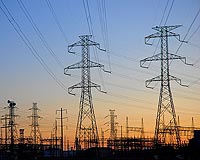 |
Zaragoza, Spain (SPX) Feb 24, 2010 Researchers from the University of Zaragoza (UNIZAR) have calculated the energy and economic potential of urban solid waste, sludge from water treatment plants and livestock slurry for generating electricity in Spain. These residues are alternative sources of renewable energy, which are more environmentally friendly and, in the case of solid urban waste, more cost effective. Using waste to generate electricity has economic and environmental advantages. "It gives added value to waste, because it can be seen as a type of fuel with zero cost, or even a negative cost if taxes are paid to collect it", Norberto Fueyo, lead author of the study and a researcher at the Fluid Mechanics Group of the UNIZAR, tells SINC. According to the researcher, generating electricity from waste avoids "pernicious" impacts. Waste in landfill sites releases methane and other polluting gases, so incinerating solid urban waste will reduce the volume of waste that reaches the landfill sites in the first places, as well as the implicit risks of landfills themselves (possible emission of methane into the atmosphere). The study, published in the latest issue of the journal Renewable Energy, has shown that waste in Spain could generate between 8.13 and 20.95 TWh (terawatt hours). "This electricity generation was 7.2% of electricity demand in 2008", says Fueyo. The researchers stress that the amount of methane generated from different kinds of residues is equivalent to 7.6% of gas consumption in 2008. In terms of the economic cost, "solid urban waste is the most cost-effective", according to the researcher, because local authorities carry out the waste collection and local inhabitants pay for it. Since the waste is transported to large landfill sites or waste treatment plants, installing electricity generation systems "could take advantage of economies of scale due to the large volumes involved".
Cost depends on the heat generated "However, its profitability relies on being able to get value out of the heat generated during the process", explains Fueyo, who says this technique is "not competitive, but makes use of the heat to offset the costs of generation". However, the researchers point out that "directly applying this waste to agricultural land as fertiliser could contaminate groundwater with nitrates". In order to evaluate the potential and the cost of generating electricity, the researchers applied the methodology in municipal areas (in the case of solid urban waste and sludge from water treatment plants) and regional areas (for livestock slurry) throughout the whole of Spain. The work shows that the centre and south of the Iberian Peninsula, the Balearic and Canary Islands have the "greatest interest" in putting technologies into place to use solid urban waste. In terms of using water treatment plant sludge, the coastal areas of Galicia. Valencia and Alicante, as well as central and southern Spain, were also areas of interest. The study also shows that certain areas of Aragon, Castilla-La-Mancha, Castilla-y-Leon, Extremadura, Galicia and Andalusia "would be effective" for using livestock slurry.
The EU 20-20-20 package "For Spain, each one of these targets alone is a challenge, which becomes much bigger when they are all taken together", underscores the scientist. Norberto Fueyo says the most problematic objective is that relating to increasing the amount of biofuels used in transport by 10%. "It is not achievable and is socially and environmentally questionable, because of the amount of land it requires and because it means using foodstuffs to produce fuel". Even if the figure of 10% of biofuels in transport is achieved, "there will need to be an increase of around 45% in the contribution of renewables (including hydroelectric energy) to electricity generation in order to achieve a figure of 20% of renewable energy within total consumption", the expert says. The scientist adds that, in order to achieve the objective, it will be "essential" to promote energy saving and efficiency "and consider all possible sources of renewable energy, including waste". Gomez, Antonio; Zubizarreta, Javier; Rodr�gues, Marcos; Dopazo, Cesar; Fueyo, Norberto. "Potential and cost of electricity generation from human and animal waste in Spain" Renewable Energy 35(2): 498-505, febrero de 2010.
Share This Article With Planet Earth
Related Links Spanish Foundation for Science and Technology Powering The World in the 21st Century at Energy-Daily.com
 Smart Electricity Transmission Critical To Renewable Energy Potential
Smart Electricity Transmission Critical To Renewable Energy PotentialParis, France (SPX) Feb 23, 2010 Smarter power grids have a central role to move Europe towards a low carbon energy economy, as underlined by the European Union's Strategic Energy Technology Plan Information System (SETIS) , led by the Joint Research Centre (JRC). A new JRC lead-authored report on transmission network planning highlights that a radical change in coordinated network planning and operation is needed to acco ... read more |
|
| The content herein, unless otherwise known to be public domain, are Copyright 1995-2010 - SpaceDaily. AFP and UPI Wire Stories are copyright Agence France-Presse and United Press International. ESA Portal Reports are copyright European Space Agency. All NASA sourced material is public domain. Additional copyrights may apply in whole or part to other bona fide parties. Advertising does not imply endorsement,agreement or approval of any opinions, statements or information provided by SpaceDaily on any Web page published or hosted by SpaceDaily. Privacy Statement |